March feels like a month of renewal, and our selections of translated literatures this week presents a wondrous and wide-ranging array of original thinking, ideations, philosophies, and poetics. From a revelatory collection of Chinese science fiction, to art critic María Gainza’s novel of forgery and authenticity, to Elena Ferrante’s new collection of essays on writing, and a debut collection of poetry from Iranian-Swedish poet Iman Mohammed—there is no shortage of discovery amidst these texts. Read on to find out more!
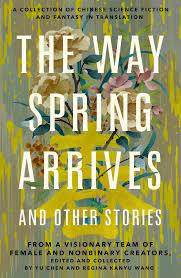
The Way Spring Arrives and Other Stories, edited and collected by Yu Chen and Regina Kanyu Wang, Tordotcom Publishing, 2022
Review by Ah-reum Han
The Way Spring Arrives and Other Stories is a trailblazing new anthology of Chinese science fiction and fantasy, created by and featuring the works of an all-female and nonbinary team of writers, editors, and translators. As a lifelong fan of the science fiction and fantasy genre but new to contemporary Chinese literary scene, I found this collection a true gift—warm and generous to the novice like myself, for whom Chinese literature has only ever been accessible through translation. Under the meticulous curatorial vision of Yu Chen and Regina Kanyu Wang, the stories and essays within celebrate decorated and emerging voices alike, indicating at an exciting future of sci-fi and fantasy for digital natives in our culturally porous world.
As you enter the collection, leave everything at the door and hold on tight. This book will whisk you away from one uncanny valley to the next—from a world where children raise baby stars as pets, to a near future where parenting is turned into a computer game, to a fisherman’s village where they practice the art of dragonslaying, to a woman on the road mysteriously burdened with a corpse, and much more. The title story, “The Way Spring Arrives” by Wang Nuonuo (trans. Rebecca F. Kuang), situates itself amidst the babbling creeks where giant fish carry the rhythm of the seasons on its back, delivering spring from year to year. In “A Brief History of Beinakan Disaster as Told in a Sinitic Language” by Nian Yu (trans. Ru-Ping Chen), we are caught in a post-apocalyptic world, where people live under the threat of devastating heat currents and history pervades as literal memory capsules passed down by a select few. Despite the imaginative heights these stories reach, each creates enough space in its strangeness for us to reexamine our assumptions about the world and our place in it. Often, folklore and fantasy crosses into sci-fi and allegory, and readers are left feeling unsettled in even the most familiar landscapes.
Between these stories, you’ll find essays on genre, gender, and translation that enrich the surrounding fictions; these intelligent texts help orient readers in socio-political, historical, and global contexts, while looking to the future of this young genre. In “Net Novels and the She Era,” Xueting Christine Ni discusses the role the internet has played in disrupting gender norms within publishing—particularly in the case of the popular online sci-fi serials. In Jing Tsu’s essay on the collection at hand, she points out: “This volume shows that there is also a difference between science fiction about women and other marginalized genders and the ones written by them.” We also hear from translators, such as Rebecca F. Kuang, who writes about the symbiotic relationship between writer, translator, and reader—the choices implicit in the things left unsaid. “What Does the Fox Say” by Xia Jia is a playful de-reconstruction of the famous English pangram—“The quick brown fox jumps over the lazy dog”—as both story and essay, illuminating the act of translation in a modern world of search engines, artificial intelligence, translation software, and media. As the author notes: “intersexuality is the dominant mode to create as well as to read most of the works in our time: quotation, collage, tribute, deconstruction, parody.” This collection pioneers its own conversation around its stories. We are paused at intervals to consider: who are we really, and where do we go from here? READ MORE…

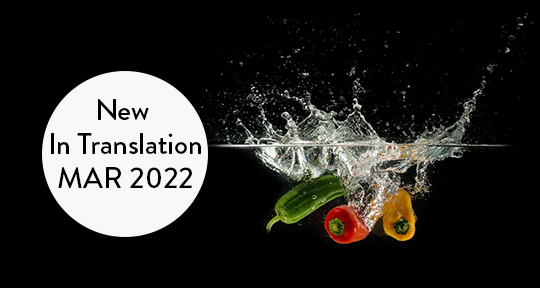
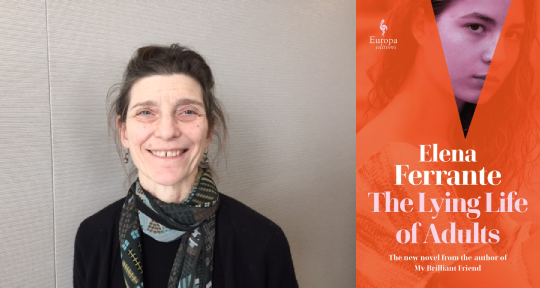
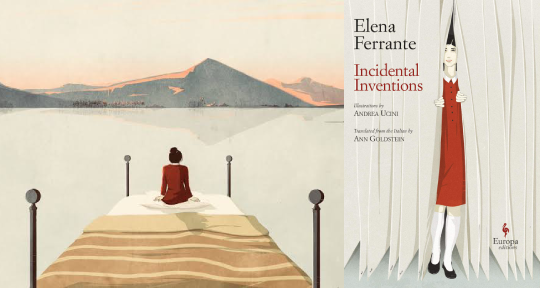
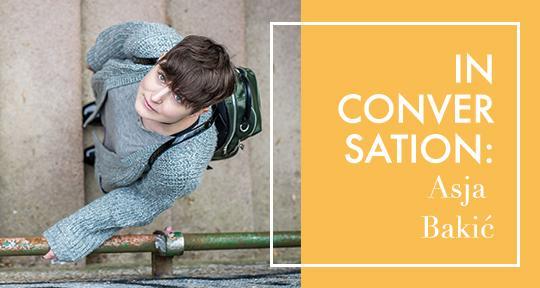

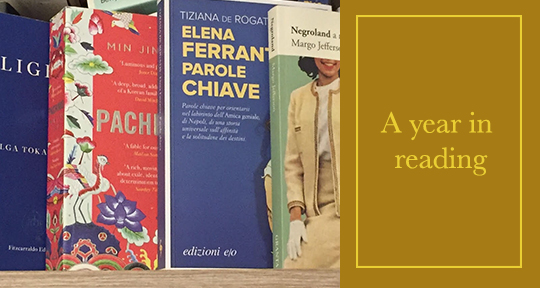



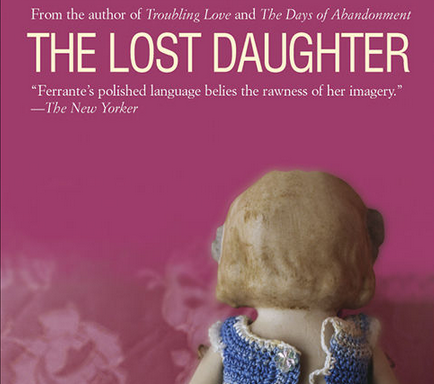
From Silly to Deadly: On Shalash the Iraqi by Shalash
. . .key to the humourist’s arsenal is none other than language itself—its malleability, its capacity for aggrandisement and diminishment alike.
Shalash the Iraqi by Shalash, translated from the Arabic by Luke Leafgren, And Other Stories, 2023
Anonymity fascinates and seduces. Endless speculations have circled invasively around who Elena Ferrante “truly” is; Catherine Lacey’s recent Biography of X reckons with erasing a layered past with a single letter of the alphabet; the first season of Bridgerton, the hit Regency-era romance on Netflix, has its narrative engine propelled by the question of Lady Whistledown’s real identity. These instances from the Global North exemplify the allure of mystery, but they fail to account for the stakes of remaining nameless in a political climate where to unveil oneself might be to threaten one’s own safety.
One might, in a moment of facetiousness, think of the eponymous chronicler of Shalash the Iraqi as the Lady Whistledown of Iraq’s Sadr City (or Thawra City, as it is lovingly christened by Shalash). Both issued frequent dispatches from within the epicentre of social disarray, guaranteeing the pleasure of gossip. More importantly, their pseudonymous veneers facilitated a lurid candour that might not otherwise have been possible.
There the similarities end. The respectable circles of upper-crust London did not live in the penumbra of foreign occupation. Nor were they plagued with the constant risk of spectacular sectarian violence, or hampered by a corrupt government that has “thieves, cheats, swindlers, traders in conspiracies” for politicians. It was against such chaos that Shalash released his explosive, timely blog posts, garnering a rapidly expanding local readership despite patchy Internet access in the country. The academic Kanan Makiya tells us, in his introduction, that people were printing out the posts, “copying them longhand,” “bombarding Shalash with questions and opinions.” Even high-ranking cadres could not resist partaking in the fanfare: one official expressed admiration while entreating Shalash not to mock him, for fear of his children’s potential disappointment. Another claimed that upon reading the daily communiqués, he would fall off his chair laughing.
Laughter, perhaps, can always be counted on to forge an affinity, if not a unity, beyond fractures of sect, status, and ethnic affiliation. Iraqis would “drop everything for a good laugh”; they gather in bars and down glasses of arak to immerse themselves in a “great, communal, and nondenominational drunkenness.” Shalash knows this, and abundantly turns it to his advantage. Nothing and no one is spared from the crosshairs of his ridicule, populated by a variegated cast that encompasses sermonisers, soldiers, suicide bombers, and donkeys. A vice-president’s verbal pomposity sounds like “he just ate a few expensive dictionaries and is about to lose his lunch.” A woman about to be married off to an Australian cousin is told, should her fiancé divorce her, “just tell everyone that he’s a terrorist and you’ll have nothing to worry about.” An odious neighbour, eager to save a spot for himself in paradise, proselytises the necessity of voting in the referendum for Iraq’s new constitution: “Don’t you know the going rate for rewards in heaven for helping ratify the constitution? It’s worth a hundred visits to the shrine of the Eighth Imam, and that’s on the far side of Iran!” When the narrator casually uses Google Earth, he is accused of lecherously spying on the women of his residence, sparking off a widespread hysteria—and court case—about the “violation of the morals of the block.” Each instance of mockery is a shard in a wider mirror of collective trauma.
READ MORE…
Contributor:- Alex Tan
; Language: - Arabic
; Place: - Iraq
; Writers: - Abu al-Qasim
, - Ahmed Saadawi
, - Catherine Lacey
, - Elena Ferrante
, - Emily Dickinson
, - Hassan Blasim
, - Kanan Makiya
, - Maya Abu al-Hayyat
, - Shalash
; Tags: - American occupation
, - anonymity
, - arabic literature
, - blogging
, - humor
, - Iraqi literature
, - social commentary
, - US Invasion of Iraq